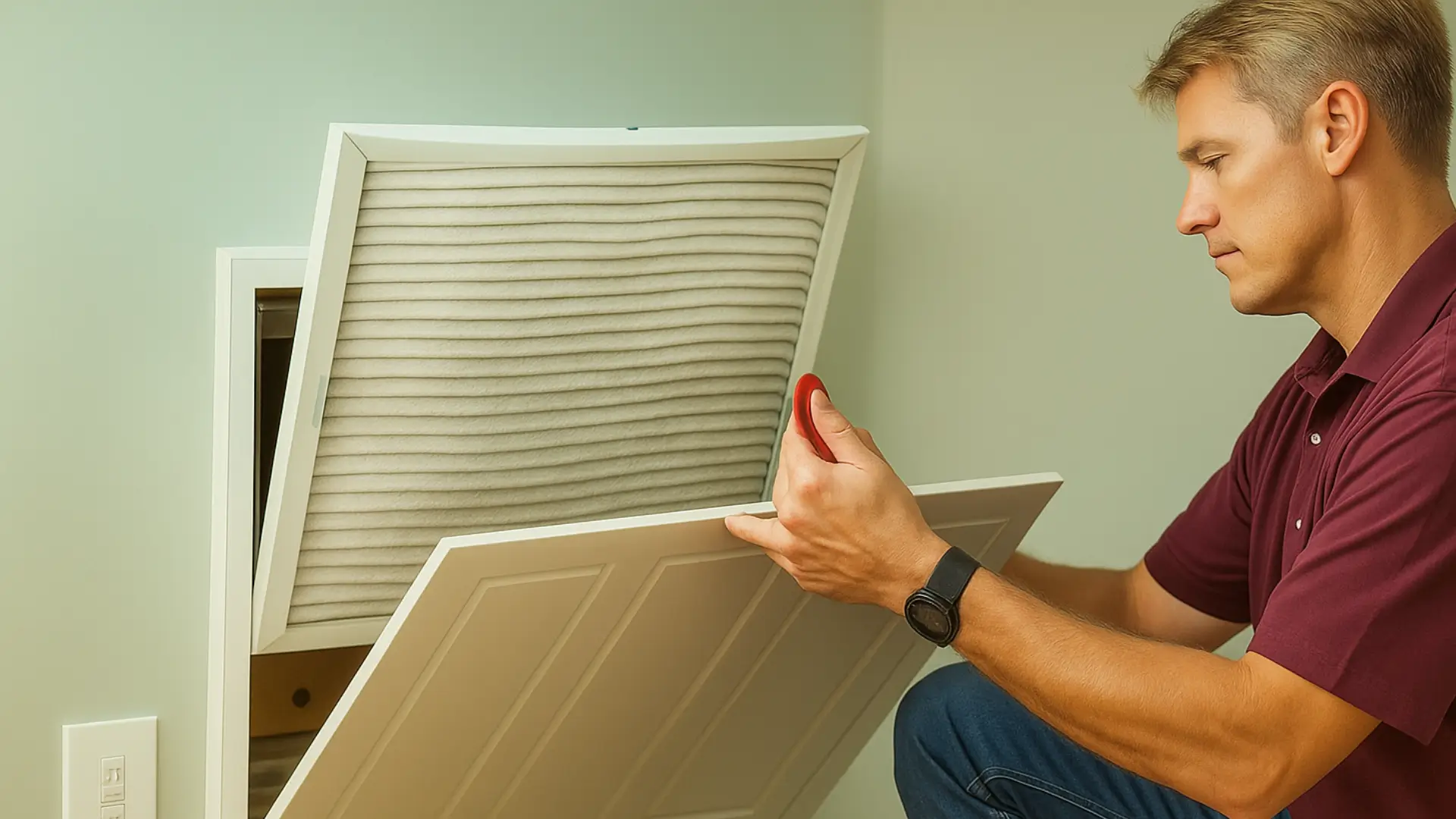Introduction: Why AC Filters Matter for Cooling
Air conditioning isn’t just about comfort—it’s about efficiency, energy bills, and indoor air quality. One of the smallest parts of your system, the air filter, plays one of the biggest roles in how well your AC cools your home. Homeowners often ask:
- Does changing the air filter actually make my AC colder?
- Does cleaning the AC filter affect cooling in the house?
- Should I clean or replace it, and how often?
This guide answers those questions with clear, practical explanations, plus a simple step-by-step cleaning guide.
Does Changing Your AC Filter Make the Air Colder?
The short answer: yes—if your old filter was dirty or clogged.
A clogged filter blocks airflow. That means less air passes over the evaporator coil, so less cool air is delivered into your home. As a result, rooms may feel warmer even when the thermostat is set low.
Replacing the filter immediately restores proper airflow, allowing your system to circulate cold air efficiently again. Many homeowners notice the difference in comfort within just a few hours of operation.
Read More: What happens if you run your HVAC without a filter?
How a Dirty AC Filter Affects Cooling in Your Home
When your filter isn’t changed regularly, it has a direct effect on cooling performance. Here’s what happens:
- Restricted airflow: The blower fan struggles to push air through the clogged material.
- Uneven cooling: Some rooms may feel cooler than others.
- Frozen evaporator coil: Too little airflow can cause ice buildup, which stops cooling completely.
- Higher energy bills: The system runs longer, using more electricity.
- Added wear and tear: Over time, blocked airflow puts stress on motors, fans, and coils—shortening the life of your AC.
So while a filter may look like a simple piece of mesh, it has a huge impact on how cold your AC feels.
Read More: Can a dirty filter shut off your AC unit?
Does Cleaning an AC Filter Make It Colder vs. Replacing It?
This depends on the type of filter you have:
- Washable filters: These can be removed, cleaned with water, dried fully, and reused. Cleaning restores airflow and improves cooling.
- Disposable filters: These should never be washed. Once they’re clogged, the fibers can’t be cleaned properly, and water may damage them. They must be replaced.
If your AC still isn’t cooling properly after cleaning or replacing the filter, the issue is likely elsewhere—such as refrigerant levels, dirty coils, or duct leaks.
Read More: What factors should be considered when choosing an air filter?
Step-by-Step: How to Clean a Window AC Filter
For homeowners searching how to clean window AC filter, here’s a safe DIY method:
- Turn off and unplug the AC unit.
- Remove the front panel and carefully slide out the filter.
- Vacuum loose dust and debris using a handheld vacuum or brush attachment.
- Rinse under lukewarm water until the filter looks clean. Avoid hot water or harsh cleaners.
- Allow the filter to dry completely before putting it back.
- Reinstall the filter and secure the front panel.
- Restart the unit and check airflow.
Repeat this cleaning process every 30 days during heavy use. A dirty filter can cut cooling efficiency by up to 15 percent.
How Often Should You Change Your AC Filter?
There’s no one-size-fits-all answer—it depends on your home and lifestyle. General guidelines are:
- Every 1–3 months for most homes.
- Every 30–45 days if you have pets or allergies.
- Monthly changes in dusty regions like Las Vegas and Pahrump.
- Seasonal changes (spring, summer, fall) for homes with light AC use.
Following this schedule ensures your AC doesn’t lose cooling power and helps maintain healthy indoor air quality.
Other Factors That Can Affect Cooling (Even with a Clean Filter)
If you’ve just replaced your filter and your AC still isn’t cooling well, there could be other problems:
- Low refrigerant: Without enough refrigerant, the system can’t remove heat effectively.
- Dirty coils: Dust on coils reduces heat transfer, making cooling less efficient.
- Duct leaks: Air escapes before it reaches your rooms, lowering comfort.
- Poor insulation or air leaks in your home: Even a strong AC can’t fight heat gain from outside.
These issues require a professional HVAC technician to diagnose and fix.
FAQ: Common Questions About AC Filters and Cooling
1. Does AC filter affect cooling in house?
Yes. A clogged filter is one of the most common causes of poor AC performance. It restricts airflow, making rooms feel warmer.
2. Does changing the air filter improve air conditioning?
Yes. It allows your AC to run efficiently, improving airflow and cooling while lowering energy use.
3. Does changing the air filter make the AC cooler instantly?
You’ll usually notice stronger airflow within hours. Full comfort may take a day of continuous cooling.
4. How long does it take to feel colder air after changing the filter?
Most homeowners feel the difference within the same day, especially during peak cooling cycles.
5. Can a dirty AC filter cause no cooling at all?
Yes. Severe blockages can cause ice buildup on the coil, which stops cooling entirely until the filter is replaced and the coil thaws.
Conclusion: Keep Your AC Colder with Regular Filter Maintenance
Changing or cleaning your AC filter is one of the easiest and most effective ways to keep your air conditioner cooling properly. While it won’t fix every issue, it restores airflow, improves efficiency, and can make your home feel noticeably colder almost immediately.
If you’ve changed your filter and your AC still isn’t cooling as it should, the problem may be deeper. At Gunny’s, we provide professional HVAC services in Las Vegas, including AC filter replacement, system inspections, and same-day repair.
Schedule your service today to restore your cooling comfort and keep your system running at peak performance.










